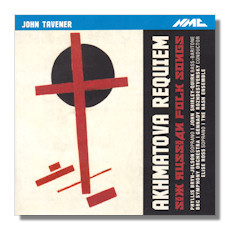
The Internet's Premier Classical Music Source
Related Links
- Tavener Reviews
- Latest Reviews
- More Reviews
-
By Composer
-
Collections
DVD & Blu-ray
Books
Concert Reviews
Articles/Interviews
Software
Audio
Search Amazon
Recommended Links
Site News
 CD Review
CD Review
John Tavener

- Akhmatova Requiem
- Six Russian Folk Songs *
Phyllis Bryn-Julson, soprano
John Shirley-Quirk, bass-baritone
* Elise Ross, soprano
* Nash Ensemble
BBC Symphony Orchestra/Gennady Rozhdestvensky
NMC D208 69:00
John Tavener, who died a year ago last month (in November 2013), had a serene, peaceful yet sturdy and extensive attachment to the Russian spirit. The poetry of Anna Akhmatova (1889-1966) is searing, and equally uncompromising in confronting the evils of oppression and the results of subjugating the individual to the authoritarian. The main work on this CD from NMC celebrates the creative affinity between Tavener and Akhmatova. It's a splendid recording from the 1981 Proms season. The then conductor of the BBC Symphony Orchestra, Gennady Rozhdestvensky, performed the work's first performance with leading soloists and the Orchestra on top form.
Akhmatova wrote her cycle in the late 1930s as a grim denunciation of the Stalinist regime. Expressing anguish as one might bewail a premature entombment, its verbal starkness and the bleakness of its outlook inspired Tavener to write his work quickly, feverishly almost, in 1980. As if even more gravity and passion were needed, the composer added excerpts of Russian Orthodox chant. As Stravinsky was capable of doing, Tavener concentrates on the ritual aspect of the nexus between music and text to hold us back from immersion into the overwhelmingly tragic in favor of a certain distance, which allows reflection. The result is, rightly, music, not commentary.
Whether – as the piece, which lasts over 50 minutes, comes to its somber close – you still feel detached may be another matter. Soprano Phyllis Bryn-Julson is transparent and clean, almost aware of how to show pity, yet witholding pity in her delivery of Akhmatova's indictment. But clearly never unaffected; nor does she ever intend us to react with simplicity or disinterest. By eschewing piety and declamation the irony of the poet's words is heightened. Surely a Russian characteristic; one thinks of how Shostakovich achieved the same intensity through understatement.
Rozhdestvensky rightly and successfully emphasizes severity, formalism, grimness and numbness. Yet not by skewing the playing towards empty drama or demanding histrionic singing. Nor yet is his approach gauche or even bordering on the sarcastic. He offers no caricature in the other direction. True to Tavener's intent and strengths, this interpretation is colorful, rich, has depth and makes its point by stripping the way in which the music supports the text back to the facts of suffering (the analog to the tribulation of the people is Mary's suffering at the crucifixion). Austerity is its own message.
The Six Russian Folk Songs make an apt counterbalance to the misery of the Requiem. Soprano Elise Ross sings with the Nash Ensemble (also one of the most respected of its kind by the time of these recordings). She infuses them with the relief which Tavener describes himself as having felt when he finished the opera Therese. Dating from 1978, they show an unmistakable affinity with the folk songs that informed some of Stravinsky's work. They have in common with the Akhmatova Requiem the way in which, if left to speak for itself, Russian creativity is often an inspiring antidote for the suffering, lack, oppression (Feudal, Tsarist or Soviet) which it addresses. This performance was recorded in 1979 – nine months after the Songs' premiere.
Again, the recording is as punchy and forward as are the delivery of words and projection of instruments by the Nash Ensemble. Again, if approached in the right way, this music is satisfying beyond a recreation of Russian folk song. Such an approach might well mean a blend between open-mindedness (many of the audience at the Prom walked out of that performance in 1981, which Tavener took as: "a rebuff to those critics of my music who find it too easy") and awareness of the exact nature (which evolved significantly) of Tavener's attachment and attitudes to Russian and Christian Orthodoxy. The same can be said of the Requiem. For the composer came to believe that all organized religions are differing interpretations of the same underlying forces. This significantly informed – and accounts in large part for – the Universalist appeal of both these works. And the performers have understood that such an overlay is necessary for us as listeners who may or may not share the particular beliefs to make the most of the music.
For its age, the acoustic on this CD is extremely good and from the disk's SPARS Code the recordings seem to have been made digitally. It has the spaciousness and resonance of the Royal Albert Hall; every syllable is clear, and the personalities of the BBCSO sections and individuals (especially the brass and percussion) shine through. The booklet is minimal, has brief backgrounds on composer and poet as well as the texts in English only for the Requiem and synopses for the Folk Songs. Previously issued on Carlton Classics in its BBC Radio Classics series, this is the only recording of what Tavener describes as "one of the peak achievements of my middle life"; and it's a stunning one which should be snapped up by Tavener enthusiasts. Indeed by anyone wanting to explore original relationships between Modernist text and popular, conventional twentieth century music.
Copyright © 2014, Mark Sealey




















